- Clone
- 7D11 (See other available formats)
- Regulatory Status
- RUO
- Other Names
- Beta-dystroglycan, Beta-DG
- Isotype
- Mouse IgG1, κ
- Ave. Rating
- Submit a Review
- Product Citations
- publications
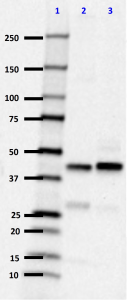
-

Western blot of purified anti-β-Dystroglycan antibody (clone 7D11). Lane 1: Molecular weight marker; Lane 2: 20 µg of human brain lysate; Lane 3: 20 µg of mouse brain lysate. The blot was incubated with 1 µg/mL of the primary antibody overnight at 4°C, followed by incubation with HRP labeled goat anti-mouse IgG (Cat. No. 405306). Enhanced chemiluminescence was used as the detection system. -

IHC staining of purified anti-β-Dystroglycan antibody (clone 7D11) on formalin-fixed paraffin-embedded normal human brain tissue. Following antigen retrieval using Sodium Citrate H.I.E.R, the tissue was incubated with the primary antibody at 5 µg/ml overnight at 4°C. Biolegend's Ultra-Streptavidin (USA) HRP kit (Multi-Species, DAB, Cat. No. 929901) was used for detection followed by hematoxylin counterstaining, according to the protocol provided. -

IHC staining of purified anti-β-Dystroglycan antibody (clone 7D11) on formalin-fixed paraffin-embedded human heart tissue. Following antigen retrieval using Sodium Citrate H.I.E.R., the tissue was incubated with 0.1 µg/ml of the primary antibody overnight at 4°C. BioLegend's Ultra-Streptavidin (USA) HRP kit (Multi-Species, DAB, Cat. No. 929901) was used for detection followed by hematoxylin counterstaining, according to the protocol provided. The image was captured with a 40X objective. Scale bar: 50 µm -

IHC staining of purified anti-β-Dystroglycan antibody (clone 7D11) on formalin-fixed paraffin-embedded mouse brain tissue. Following antigen retrieval using Sodium Citrate H.I.E.R., the tissue was incubated with 0.1 µg/ml of the primary antibody overnight at 4°C. BioLegend's Ultra-Streptavidin (USA) HRP kit (Multi-Species, DAB, Cat. No. 929901) was used for detection followed by hematoxylin counterstaining, according to the protocol provided. The image was captured with a 40X objective. Scale bar: 50 µm -

IHC staining of purified anti-β-Dystroglycan antibody (clone 7D11) on formalin-fixed paraffin-embedded mouse heart tissue. Following antigen retrieval using Sodium Citrate H.I.E.R., the tissue was incubated with 0.1 µg/ml of the primary antibody overnight at 4°C. BioLegend's Ultra-Streptavidin (USA) HRP kit (Multi-Species, DAB, Cat. No. 929901) was used for detection followed by hematoxylin counterstaining, according to the protocol provided. The image was captured with a 40X objective. Scale bar: 50 µm
| Cat # | Size | Price | Quantity Check Availability | Save | ||
|---|---|---|---|---|---|---|
| 850201 | 25 µg | 76€ | ||||
| 850202 | 100 µg | 193€ | ||||
Dystroglycan is a central component of dystrophin-glycoprotein complex that is encoded by the DAG1 gene. Dystroglycan links the cytoskeletal structure to the extracellular matrix. Dystroglycan is proteolytically cleaved to 2 functional peptides, α- and β-dystroglycan. β-dystroglycan is a transmembrane protein, which acts as a cell adhesion receptor in human tissues. The interactions between β-dystroglycan and dystrophin and Utrophin scaffolds axin to the cytoskeleton. β-dystroglycan also has been reported to play a role in cell adhesion-mediated signaling and is implicated in cell polarity.
Product DetailsProduct Details
- Verified Reactivity
- Human, Mouse
- Antibody Type
- Monoclonal
- Host Species
- Mouse
- Immunogen
- KLH-conjugated peptide corresponding to the last 15 amino acids (KNMTPYRSPPPYVPP) of L-Dystroglycan.
- Formulation
- Phosphate-buffered solution, pH 7.2, containing 0.09% sodium azide.
- Preparation
- The antibody was purified by affinity chromatography.
- Concentration
- 0.5 mg/ml
- Storage & Handling
- The antibody solution should be stored undiluted between 2°C and 8°C.
- Application
-
WB - Quality tested
IHC-P - Verified
IHC-F, ICC - Reported in the literature, not verified in house - Recommended Usage
-
Each lot of this antibody is quality control tested by Western blotting. For Western blotting, the suggested use of this reagent is 1.0 - 5.0 µg per ml. For immunohistochemical staining on formalin-fixed paraffin-embedded tissue sections, the suggested use of this reagent is 0.1 - 10 µg per ml. It is recommended that the reagent be titrated for optimal performance for each application.
-
Application References
(PubMed link indicates BioLegend citation) -
- Praissman JL, et al. 2016. Elife. E14473 (ICC)
- Vasquez-Limeta A, et al. 2014. PLoS One. 9(3):e90629 (WB)
- Martinez-Vieyra IA, et al. 2013. biochim Biophys Acta. 1833(3):698 (ICC, WB)
- Beedle AM, et al. 2012. J Clin Invest. 122(9):3330 (IHC-F, WB)
- Hu H, et al. 2011. Neurosci Lett. 489(1): 10 (WB)
- Product Citations
-
- RRID
-
AB_2715870 (BioLegend Cat. No. 850201)
AB_2715870 (BioLegend Cat. No. 850202)
Antigen Details
- Structure
- Dystroglycan is an 895 amino acid protein with a molecular mass of ~97 kD. β-dystroglycan, a cleavage product of dystroglycan, is a 242 amino acid protein with a molecular mass of ~43 kD.
- Distribution
-
Tissue distribution: Primarily expressed in muscle tissue. Also present in other tissue including CNS.
Cellular distribution: nucleus, plasma membrane, and cytoskeleton. - Function
- β-dystroglycan is involved in a number of processes including laminin and basement membrane assembly, sarcolemmal stability, cell survival, peripheral nerve myelination, nodal structure, cell migration, and epithelial polarization.
- Interaction
- Interacts with Dystrophin, Utrophin and other cytoskeletal components such as axin.
- Ligand/Receptor
- Receptor for Dystrophin and Utrophin
- Biology Area
- Cell Biology, Neuroscience, Neuroscience Cell Markers
- Antigen References
-
1. Murphy S, et al. 2015. Comput Struct Biotechnol J. 14:20-7
2. Moore CJ, et al. 2012. Neuromuscul Disord. 22(11): 959 - Gene ID
- 1605 View all products for this Gene ID
- UniProt
- View information about beta-Dystroglycan on UniProt.org
Related Pages & Pathways
Pages
Other Formats
View All beta-Dystroglycan Reagents Request Custom Conjugation| Description | Clone | Applications |
|---|---|---|
| Purified anti-β-Dystroglycan | 7D11 | WB,IHC-P,IHC-F,ICC |
Compare Data Across All Formats
This data display is provided for general comparisons between formats.
Your actual data may vary due to variations in samples, target cells, instruments and their settings, staining conditions, and other factors.
If you need assistance with selecting the best format contact our expert technical support team.
-
Purified anti-β-Dystroglycan
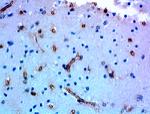
IHC staining of purified anti-β-Dystroglycan antibody (clone... 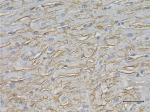
IHC staining of purified anti-β-Dystroglycan antibody (clone... 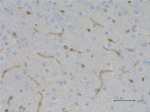
IHC staining of purified anti-β-Dystroglycan antibody (clone... 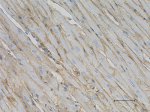
IHC staining of purified anti-β-Dystroglycan antibody (clone... 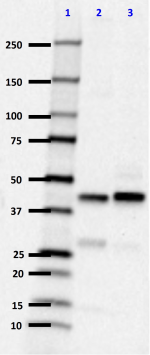
Western blot of purified anti-β-Dystroglycan antibody (clone...
 Login / Register
Login / Register 







Follow Us